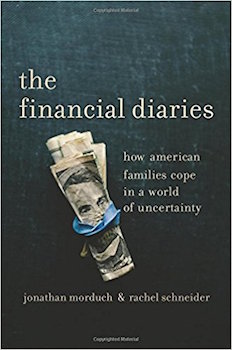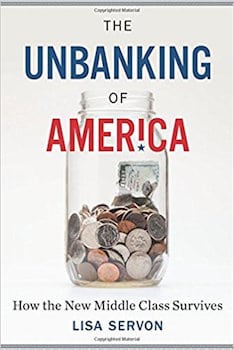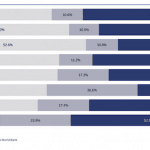The Financial Lives of Struggling Americans: The Financial Diaries and The Unbanking of America
Two books published this year, The Financial Diaries, by Jonathan Morduch and Rachel Schneider, and The Unbanking of America, by Lisa Servon, take on the state of financial inclusion in the United States. Given the professional standing of their authors, we can expect that these books will contribute substantially to the body of knowledge on financial inclusion. What is perhaps more surprising is just how broadly important their messages are. Both books examine what is arguably the top economic challenge in America today – the crumbling of the economic foundation for many working-class and middle-class families – and they do so through the lens of financial services, a somewhat unusual but very revealing perspective.
 The Financial Diaries: How American Families Cope in a World of Uncertainty focuses on the variability of income and expenses, which makes it hard for an increasing number of Americans to maintain a steady standard of living. The weekly and monthly extent of this volatility eluded most national statistics until the Diaries project, with its unique methodology, which was developed initially to study financial behavior in low-income countries. During a Diaries project, researchers record every financial transaction made by participating families each week for a year. This detailing yields intimate portraits of families’ financial lives at a level of magnification not previously available.
The Financial Diaries: How American Families Cope in a World of Uncertainty focuses on the variability of income and expenses, which makes it hard for an increasing number of Americans to maintain a steady standard of living. The weekly and monthly extent of this volatility eluded most national statistics until the Diaries project, with its unique methodology, which was developed initially to study financial behavior in low-income countries. During a Diaries project, researchers record every financial transaction made by participating families each week for a year. This detailing yields intimate portraits of families’ financial lives at a level of magnification not previously available.
Diaries confirms that volatility is rising on the income side because employers are shifting away from offering full-time jobs with benefits. Many people work on commission, on variable schedules, or in the “gig” economy. We are introduced to the Moore family, whose main earner works full-time in an outdoor job. Since his pay is commission-based, it varies broadly by season, and weekly by weather conditions. The Moores resort to many small strategies to cope with this uncertainty, from coupon clipping to borrowing from family.
As for expense volatility, Morduch and Schneider point to health costs, especially for people whose more affordable health plans carry high deductibles. And expense volatility goes well beyond health. For families living on a financial knife-edge, even common problems like car or appliance repairs can disrupt household budgets. Families like the Moores often let recurring bills slide in order to get through the month, deferring payment until their tax refund arrives and they can square up. This is a sensible, though often costly, money management technique – as families work to make income and expense volatility match up.
Diaries offers suggestions about financial services to help families with volatile incomes. One of the most far-reaching is to upgrade American systems to real-time payments so that the check clearing lags that still complicate lives for so many can disappear. One of my favorite suggestions is a “sidecar” proposal – for automatic savings set-asides alongside automatic retirement contributions; the savings could be drawn down in emergencies without depleting retirement accounts.
The most important messages in Diaries go well beyond financial services. They speak to a need to shift risks increasingly borne by low-/moderate-income families back to employers and government – in the form of simpler government benefit programs and better-quality jobs. Given that the trend has moved in the reverse direction for decades, this may be a quixotic quest.
 The entry point for The Unbanking of America: How the Middle Class Survives is financial services rather than families, but this book also reveals the financial insecurity in the lives of low- and moderate-income Americans. Reporting on stints she did as a teller in a check cashing company in New York and a payday lender in California, Servon explains that so many people use check cashers and payday lenders rather than traditional banks because these alternative services provide friendly, approachable services, and products tailored to the financial needs of the vulnerable. Unbanking documents the same economic stressors as Diaries – increasing volatility and costs (housing, child care, health care, education) that rise while job quality declines.
The entry point for The Unbanking of America: How the Middle Class Survives is financial services rather than families, but this book also reveals the financial insecurity in the lives of low- and moderate-income Americans. Reporting on stints she did as a teller in a check cashing company in New York and a payday lender in California, Servon explains that so many people use check cashers and payday lenders rather than traditional banks because these alternative services provide friendly, approachable services, and products tailored to the financial needs of the vulnerable. Unbanking documents the same economic stressors as Diaries – increasing volatility and costs (housing, child care, health care, education) that rise while job quality declines.
Servon’s chief interest is in critiquing banks. With frequently inflammatory language, she holds big banks out as the villains to blame for organizing themselves to profit from the challenges facing the vulnerable – for example, in the “gotcha” of slow check clearing and high overdraft fees. According to Servon, “Manipulation and deception, from opaque fees to unethical debt-collection practices, run through the entire consumer financial services system.” Along with tighter government oversight of bank behavior toward consumers, Unbanking’s most enthusiastic recommendations are to allow innovators and mission-oriented financial service providers to experiment with more responsive and responsible products.
Despite their dark messages, both of these books are a pleasure to read. The authors apply care and talent to bring their subjects to life. Readers come to know the Moores and other struggling families Diaries describes, and in Unbanking they are invited into the camaraderie among employees in check cashing and payday lending companies. Scholarly research on financial services generally appeals to a limited readership, but these books are so approachable and engaging, I even recommended one of them to my sister who saw me reading it at the beach.
The readability of these books is far from incidental. It is integral to their purposes. If these books are to have the impact their authors seek and their messages deserve, they must carry their stories well into the national dialogue. Diaries is the more sober and scholarly of the two. It is based on a clear and tested research methodology that brings new information to light. It should be read widely by policymakers and legislators involved with economic policy. Unbanking offers a popular and opinionated tour of the consumer financial services landscape, meant to rev up activists and propel a political movement.
It may seem that these books have arrived at an inopportune time, given the current U.S. administration’s stance on financial sector regulation and opposition to safety nets and social programs. However, as Jonathan Morduch reminded me, the appetite is growing at the state and local level and among socially minded entrepreneurs to test policies, programs and services that create greater stability for lower-income people. These books show how the vulnerable manage their money, and that knowledge can help steer such efforts toward productive results.
Elisabeth Rhyne is managing director at the Center for Financial Inclusion at Accion, where she works to bring together diverse leaders to address challenges in inclusive finance.
- Categories
- Finance



